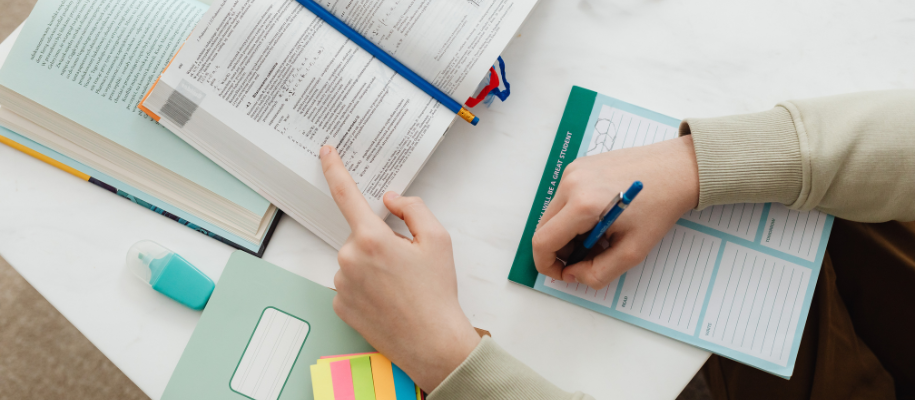As students, we’re often expected to remember large amounts of information over time for homework and tests in school. This can be overwhelming, especially when you need to retain information in preparation for a big exam that could be worth a large amount of your grade. Luckily, there are certain things you can do that can make this process smoother and help you retain more information. Here are three tips to improve your reading retention and study skills.
1. Space out your studying
There may be limited time before a big exam, but many students often wait until the last minute and are left wondering if they can tackle all the material in a day. Trying to cram chapters of material is not a recipe for success. Instead, plan out what your study schedule will look like for at least a week before the exam. You should also take into consideration the amount of time you have before an upcoming assignment and plan out your reading and assignment completion time accordingly. This can assist you tremendously as you complete smaller chunks of the material per day. Not only will this lift the load off your back, but it’ll help you get a good grasp of the material because you won’t be trying to learn too much at once. The more time you space out in studying a few chapters at a time, the more you’ll be able to remember and more clearly understand each specific portion of the material.
Related: How to Get Organized and Manage Your Time as a High School Student
2. Remember the main ideas and concepts
When reading, it can be difficult to remember every detail mentioned. A helpful strategy is to highlight or mark down the most important points from the material. By doing this, you’ll draw out key concepts you need to know. After doing so, you can go back and find supporting information that will help you further expand on those points.
Try starting this process by making a bulleted list of the most important things as you progress through your studying or assignment. Don’t limit yourself to this single method, however; you can also write paragraphs summarizing information, create charts that include similarities and differences, and more depending on what you’re comfortable with and what helps you remember information better. When you’re studying, be sure to review the points you made note of, and reread the more specific information detailing it if you need a refresher.
3. Quiz yourself
I find this tip to be the most helpful. After reading through the material and taking notes on important points, it’s essential to really ensure you remember what you’ve learned. Use different methods to test your knowledge, such as making flashcards, which help best with consistent repetition. You can also create your own quizzes covering the material, but be sure you’re being fair to yourself by making it like one you’d see in an academic setting.
I find it beneficial to look up quizzes others have created over the material—websites like Quizlet are great for this. By completing those, you won’t know the exact answers ahead of time, and you can see whether you need more honest practice in a certain area. If you find it useful, you can also practice “teaching” the material. It may be to your advantage to do this in front of an audience like a friend or family member; that way you’ll be held accountable for what you teach and whether you know the material.
Related: 5 Simple Ways You Can Make Studying More Fun
The process of studying and retaining information can seem daunting, but following these tips can help take some of the stress away. Be sure to set yourself up for success when testing your understanding of the material by exercising your memory. The more you practice repeating the material, the more successful you’ll be!
For all the help you could possibly need on your assignments, check out Our Best Advice for Homework, Studying, and Tests.







